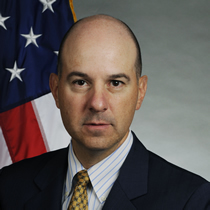In a October 19, 2010, Senators Bernard Sanders (I-VT) and Sherrod Brown (D-OH) wrote to David Kappos, the Director of the USPTO, asking for an assessment of conflicts between the October 2010 ACTA text, and U.S. law. (attached here).
 |
| Undersecretary of Commerce for Intellectual Property, David Kappos |
In a letter dated Friday, November 12, 2010, David Kappos wrote to Senators Sanders and Brown (link here). The November 12, 2010 Kappos letter was described by Senator Sanders’ office as “a non-response,” and that’s polite. Senators Sanders and Brown asked Kappos to compare the text in ACTA, highlighting in particular the articles on damages, injunctions, other remedies and border measures, against U.S. law, including but not limited to one supreme court decision and several selected statutes in the area of patents, copyrights and trademarks. The Kappos response contained no analysis, no cites to U.S. law, no cites to the ACTA text; only a thank you and a promise that “our USPTO issue experts will continue to work with USTR as they finalize the results achieved in Tokyo.”
In related issues, last week the U.S. Copyright Office declined to say that the ACTA text is consistent with the proposed orphan works legislation. Earlier Stan McCoy of USTR asserted that the Copyright Office was giving assurances that ACTA was consistent with the proposals to address orphan copyrighted works. For those who actually care about future orphan works legislation, note that the USTR and the Copyright Office are not telling the same story. (More on the orphan works/ACTA issue here, and on other inconsistencies in U.S. law here.)
 |
| Karel de Gucht, the European Commissioner for Trade |
It now appears as though the Congressional Research Service, the USPTO and the U.S. Copyright Office are refusing to say that ACTA is consistent with U.S. law, or that the ACTA provisions on copyright damages are consistent with proposed legislation to address expanded access to orphaned copyrighted works. USTR, on the other hand, shows little concern about this, and continues to assure people that the damages section of ACTA, which requires all sorts of tough measures on copyright damages, is consistent with the proposed orphan works legislation, even though the latter eliminates the remedies that ACTA will require be made available.
Finally, note that in his October 20, 2010 communication to the European Parliament, Karel De Gucht, the European Commissioner for Trade, formally referred to ACTA three times as a treaty. USTR maintains ACTA is not a treaty, will not require changes in U.S. law, and does not require the consent of the Senate.